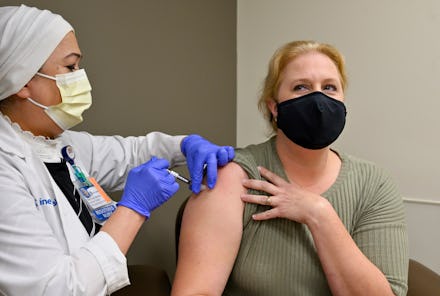Here's what to expect from the COVID booster as far as side effects

Now that the COVID-19 boosters are rolling out for older Americans and those with high-risk jobs, some of us are voicing our anxiety about side effects. A lot of people found the vaccine side effects — nightmarish chills and low grade fevers — pretty debilitating, and kind of mysterious. The cashier at my favorite bodega told me that she’s sure the third shot is going to help her grow the tail she’s always longed for. Sorry to disappoint, but according to new research, the side effects of the third COVID-19 vaccine dose will probably be similar to the second. In other words: No tail, but maybe some fatigue.
This new research was published yesterday by the CDC in their Morbidity and Mortality Weekly Report. It analyzed self-reported data from 12,600 users of the CDC’s smartphone-based COVID monitoring app, called v-safe, who received three doses of either the Pfizer or Moderna vaccines. According to the data, while some individuals did report minor side effects — like pain at the injection site for a day after getting the shot— the side effects were similar to what people reported after getting the second shot.
“These initial findings indicate no unexpected patterns of adverse reactions after an additional dose of COVID-19 vaccines; most of these adverse reactions were mild or moderate,” the researchers wrote. Basically, the side effects of the third shot will probably be NBD, just like the second dose. For every million people vaccinated, approximately 1 or 2 have had severe side effects.
But, as the authors also added, the results of the CDC’s report may not necessarily be representative of America’s vaccinated population, since using v-safe is voluntary and most of the respondents were white, STAT News reported. Still, most experts don’t foresee any significant complications resulting from booster shots.
The most pressing concern that those in the know seem to have about the third vaccine shots is the fear that they could potentially increase the risk of myocarditis and pericarditis, inflammatory heart conditions that have been found in young men and boys after the second shot, STAT News reported. As of now, boosters are not approved for this demographic, anyway.
Over 3 million people have gotten booster shots since August 13th and 1 million more already have their third shots of Pfizer scheduled, the Washington Post reported. Health officials are still debating whether everyone will even need a third shot, so the side effects of boosters may turn out to be a moot point for many of us.